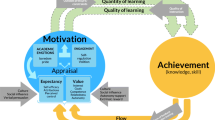Abstract
This study explores, for the first time, the study orchestrations of (mostly Black) engineering students who enter an academic support programme in their first year at university at an educational disadvantage by virtue of their exposure to an inferior, racially determined school education.
The empirical manifestation, and the stability over time, of their study orchestrations is described, and the association between their study orchestrations and learning outcome is investigated.
It is concluded that the manifestation of individual study orchestrations of these particular educationally disadvantaged engineering students, as well as the association between their study orchestrations and their learning outcomes, is essentially similar to that of other students; academic success is associated with theoretically desirable study orchestrations - particularly when these are manifested early on in the programme since they remain essentially stable over time. Where changes do occur over time they are generally of a theoretically desirable nature and, to a lesser extent, where theoretically undesirable changes occur they appear to be associated with a decline in academic achievement.
The implications of these conclusions for academic support programmes and for future research are discussed in so far as they impinge on admissions procedures, the identification of potentially ‘at risk’ students early on in the academic year and explicit provisions of intervention mechanisms to assist such students.
Similar content being viewed by others
References
Entwistle, N. J., Meyer, J. H. F. and Tait, H. forthcoming. ‘Student failure: disintegrated perceptions of studying and the learning environment’, Higher Education.
Goodman, L. A. and Kruskal, W. H. (1972). Measures of Association for Cross Classifications. New York: Springer-Verlag.
Hartshorne, K. (1988). ‘Three years of turmoil. African matric results 1985–1987’, Indicator SA 5 (2), 53–56.
Kallaway, P. (ed.) (1984). Apartheid and Education. The Education of Black South Africans. Johannesburg: Ravan Press.
Marton, F. and Säljö, R. (1976a). ‘On qualitative differences in learning: I - outcome and process’, British Journal of Educational Psychology 46, 4–11.
Marton, F. and Säljö, R. (1976b). ‘On qualitative differences in learning: II - outcome as a function of the learner's conception of the task’, British Journal of Educational Psychology 46, 115–127.
Marton, F. and Säljö, R. (1984). ‘Approaches to learning’, in Marton, F., Hounsell, D. and Entwistle, N. (eds.), The Experience of Learning. Edinburgh: Scottish Academic Press, pp. 36–55.
McNemar, Q. (1947). ‘A note on the sampling error of the difference between correlated proportions or percentages’, Psychometrika 12, 153–157.
Meyer, J. H. F. (1988). ‘Student perceptions of learning context and approaches to studying’, South African Journal of Higher Education 2, 73–82.
Meyer, J.H.F. and Muller, M. W. (1990a). ‘An unfolding analysis of the association between perceptions of learning context and approaches to studying’, South African Journal of Higher Education 4(1), 46–58.
Meyer, J. H. F. and Muller, M. W. (1990b). ‘Evaluating the quality of student learning. I - an unfolding analysis of the association between perceptions of learning context and approaches to studying at an individual level’, Studies in Higher Education 15(2), 131–154.
Meyer, J. H. F. and Parsons, P. (1989). ‘Approaches to studying and course perceptions using the Lancaster inventory - a comparative study’, Studies in Higher Education 14 (2), 137–153.
Meyer, J. H. F., Parsons, P. and Dunne, T. T. (1990). ‘Individual study orchestrations and their association with learning outcome’, Higher Education 20(1), 67–89.
Pallas, A. M., Natriello, G. and Mc Dill, E. L. (1989). ‘The changing nature of the disadvantaged population: current dimensions and future trends’, Educational Researcher 18(5), 16–22.
Parsons, P. and Meyer, J.H.F. (1990). ‘The academically ‘at risk’ student: a pilot intervention programme and its observed effects on learning outcome’, Higher Education 20(3), 323–334.
Sass, A. (1988). ‘Academic support in engineering at the University of Cape Town’, South African Journal of Higher Education 2, 25–28.
Somers, R. H. (1962). ‘A new asymmetric measure of association for ordinal variables’, American Sociological Review 27, 799–811.
Author information
Authors and Affiliations
Rights and permissions
About this article
Cite this article
Meyer, J.H.F., Parsons, P. & Dunne, T.T. Study orchestration and learning outcome: evidence of association over time among disadvantaged students. High Educ 20, 245–269 (1990). https://doi.org/10.1007/BF00136229
Issue Date:
DOI: https://doi.org/10.1007/BF00136229




